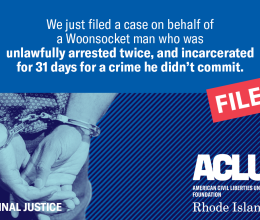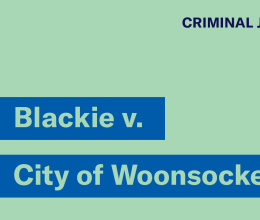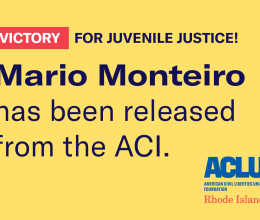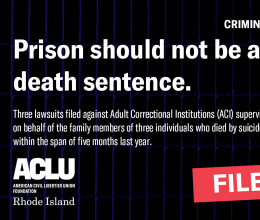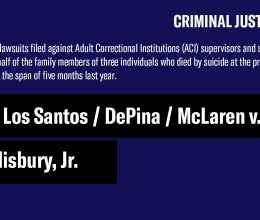In an effort to protect the rights of violent crime victims, the ACLU of Rhode Island today filed a lawsuit challenging the legality of regulations adopted by outgoing General Treasurer Paul Tavares that authorize the denial or reduction of compensation to such victims based solely on their having an unrelated drug-related criminal history or DUI conviction in their past. The lawsuit, filed in Superior Court by RI ACLU volunteer attorney Frederic Marzilli, is on behalf of the Drug and Alcohol Treatment Association of Rhode Island (DATA). In July, DATA and other organizations that service people with substance abuse problems had sharply criticized the regulations as “discriminatory and mean-spirited.”
The challenged regulation provides that if a crime victim has pled nolo or been convicted of “violent felonious criminal conduct, or DUI/DWI, or the illegal manufacture, sale or delivery of a controlled substance, or possession with intent to manufacture, sell, or deliver a controlled substance … committed within the past five (5) years or subsequent to his or her injury, the administrator may reduce or deny an award to the applicant.” Drug and DUI convictions are the only non-violent offenses added to the rules by the General Treasurer that trigger a possible denial of victim compensation. The DUI provision was added last year, and the drug offense language was adopted in July 2006. The ACLU lawsuit argues that the regulation is “arbitrary and capricious” and unlawfully allows “the General Treasurer to consider the crime victim’s non-violent criminal background in making an award of compensation.” The lawsuit seeks a court order declaring the amended regulation null and void, as well as costs and attorneys fees.
DATA is a non-profit membership organization that represents public and private alcohol and drug treatment programs and, among its goals, works to reduce the stigma associated with addictions. DATA executive director Neil A. Corkery expressed concern about singling out DUI and drug offenses, both of which are often committed by people who are suffering from diseases – alcoholism and drug addiction. He pointed out that the lawsuit was initiated only after efforts at encouraging the General Treasurer to rescind the regulations had failed.
RI ACLU executive director Steven Brown called it “unfortunate that the General Treasurer has turned a program that is supposed to aid crime victims into one that punishes them for their past misdeeds. A former drug addict who is sexually assaulted should not have to fear reduced compensation because she once sold drugs to feed her habit.” Brown noted that the state law generally makes compensation available only to victims of very serious offenses, and that the law already explicitly bars compensation when the behavior of the victim directly or indirectly contributed to his or her injury or death. RI ACLU attorney Marzilli added: “The General Treasurer’s amended regulations are counter-productive and an affront to anyone who has been a victim of a violent crime.”
DATA’s Corkery added: “The regulations discriminate and marginalize persons, many of whom have addiction disorders. For the treatment community, the action of the General Treasurer reinforces the stigma attached to those who seek treatment for their addictions and reverts to the moralization of addition disorders. If we really believe in the restorative potential of persons who receive treatment for addiction disorders, we need to abandon such negative stereotypes and regressive measures. The measure appears punitive in nature and lacking in logic in excluding individuals who, other than a prior indiscretion, appear to be assigned a double penalty.”



